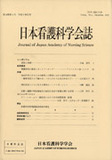Japanese
English
- 販売していません
- Abstract 文献概要
- 参考文献 Reference
- サイト内被引用 Cited by
要旨
家庭における痴呆性老人の家族である介護者との相互作用の実態を明らかにすることを目的とし,グランデッドセオリーアプローチを用いた帰納的質的研究を行った.
25組のアルツハイマー型痴呆の老人と家族を対象にし家庭訪問を行った.継続的比較分析法を用いたデータ分析の結果,痴呆性老人と介護者の相互作用における中核となる変数として,痴呆性老人の「確かさ」と「自己の保ち方」を見いだした.痴呆性老人と介護者の相互作用の特徴を表すカテゴリーのうち,本論では痴呆性老人の「確かさ」についてこだわる相互作用について論じた.
これには,介護者による痴呆性老人の「確かさ」へのこだわりのありようにより「穴探し」.「穴掘り」,「穴埋め」と呼べる小カテゴリーが含まれていた.各カテゴリーの構成要素と,特徴と相違を明らかにした.痴呆性老人と介護者の相互作用の実態の一部と相互作用で痴呆性老人が体験する世界の一端を見いだすことができたと思われる.
Abstract
The objective of this study was to clarify the actual status of interactions performed at home between demented elders and their family caregivers. An inductive qualitative study was conducted by using a grounded theory approach.
Subjects were 25 elderly individuals with dementia of Alzheimer type, and 28 caregivers in their family. The study was performed using the participant observatin and interviews in their homes.
Based on a constant comparative analysis, results revealed the levels of”certainty” and”maintenance of self” of the elders as core variables in interactions between the elders and the caregivers. Characteristic interactions were found to fall into three categories. This paper discusses part of the interactions, i. e., category 1 representing interactions associated with persistence in”certainty” of the elders.
Category 1 included the phenomena to be referred to as”looking for the hole,””digging the hole” and ”filling in the hole.” Characteristics and differences of the phenomena were reviewed.”Looking for the hole” means the interactions where the caregivers check”certainty” and/or”uncertainty”of the demented elders by testing their memory, and the demented elders unconsciously express themselves as they are.”Digging the hole” means the interactions where the caregivers try to draw”certainty” from”uncertainty” of the demented elders, and the elders degrade themselves in confusion.”Filling in the hole” means the interactions where the caregivers compensate”uncertainty" of the demented elders without checking their ”certainty,” and the elders express what they like to express.
This study revealed a part of actual interactions between the demented elders and their caregivers, and a part of the world which demented elders may experience in interaction with their caregivers.
Copyright © 1994, Japan Academy of Nursing Science. All rights reserved.


